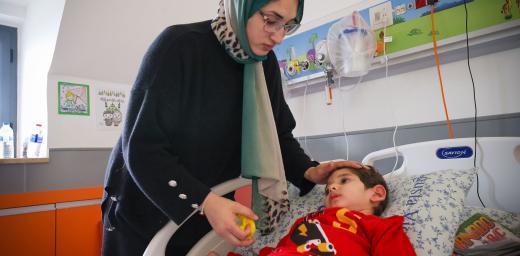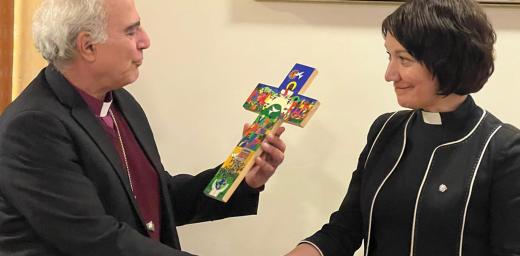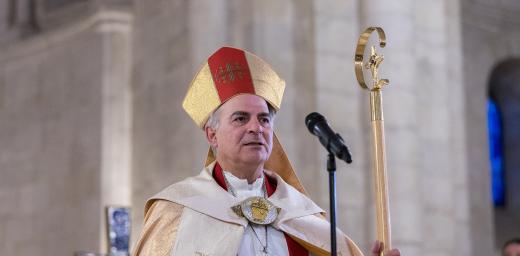Proud to be Lutherans in the Middle East
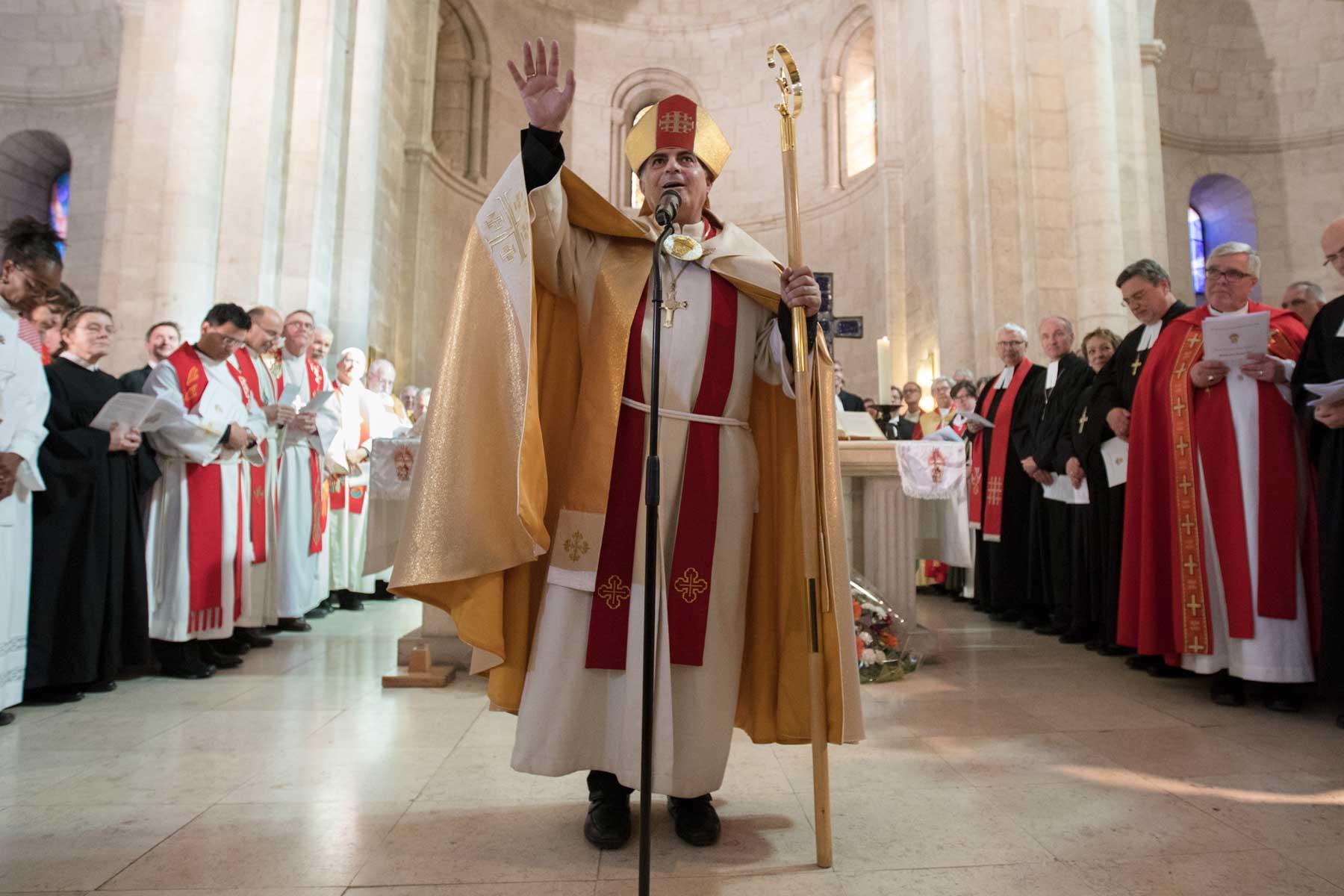
Bishop Azar at his consecration in Bethlehem. Photo: ELCJHL/ Ben Gray
New ELCJHL bishop: church is concerned about the life of the people
(LWI) - Bishop Ibrahim Azar has been installed as the new bishop of the Evangelical Lutheran Church in Jordan and the Holy Land (ELCJHL), following the departure of Bishop Munib A. Younan from the post. In an interview with Lutheran World Information, Bishop Azar discusses the challenges and hopes for the church ahead, what it is like to be Lutheran in the Middle East, priorities for the congregations, and what it means to be a part of the LWF communion of churches.
Jerusalem and the holy land is a challenging context. How does your environment affect church life?
It is a very difficult time in Palestine, Israel and Jordan. We can see these difficulties in the news. There are constant media reports about the occupation, the separation wall, and the conflict but the church is not sitting and waiting for a solution to these difficulties that we believe will come.
The church is concerned with the daily life of the people, their dreams and everyday struggles. There are so many walls that we don’t see in the hearts of the people and the church should be involved in breaking down the unseen walls in their lives. Our people have many social struggles; our children should be playing football in the park but they have other things on their mind. There is no park and there is no work, for instance, so I ask, ‘How can we be with the people as Christ?’, ‘How can the church find her way to them in their need?’, ‘How can we help them find a solution to their daily needs?’
The people need security, hope and to be reassured that they are worthy of fundamental human rights. Right now their dreams are limited due to many socio-economic issues. If children can’t dream, they lose an important part of their life.
And what do the people need? They need security, hope and to be reassured that they are worthy of fundamental human rights. Right now their dreams are limited due to many socio-economic issues. If children can’t dream, they lose an important part of their life.
What are the challenges your church faces today?
There are 13 Christian churches united by recognition of the Israeli, Palestinian and Jordanian authorities, but we understand that Christ unites all Christians despite our denominations. However, unity can be challenging if we do not know one another, if we don’t witness how the other lives. Therefore, it is important that we find ways to be in relationship with each other for more than the one week of Christian Unity. When we find time to be in prayer together and to be present with one another, we will remain united in this spirit of Christ.
What does it mean to be Lutheran in your context?
We are very proud to be Lutherans in the Middle East. It was the evangelical German Lutheran missions that first brought the Bible in Arabic to the region. Secondly, Lutherans opened schools for girls in the 19th century.
We are also aware of the role that the Lutheran World Federation played in protecting our Lutheran churches and schools after the Second World War by declaring ownership of these properties when the government was confiscating any building that was thought to be German. Because of their bold efforts, we still have these structures and ministries: Augusta Victoria Hospital, the Church of the Ascension, and our schools and churches.
Part of your ministry is running educational institutions for students from both Christian and Muslim backgrounds. How do you see this interfaith dialogue taking place?
Missions taught us that the most important thing is how we accept the other. We don’t succeed when we convert Muslims to Christians but we succeed when we create friendships with Muslims, with all. We will continue to invest our time and resources in our schools because this is where we have the biggest opportunity to create friendships through education for our Christian and Muslim students who are learning and living together.
What are the treasures of your church?
Our treasures are our six churches throughout Jerusalem, the West Bank and Jordan, our four schools and the diaconal work that our congregations and schools are doing, such as the Adult Day Care Center in Jerusalem, the Meals on Wheels program in Ramallah, and our women and youth desks. These ministries reflect the diaconal roots of missions in this region. These are our treasures, passed down.
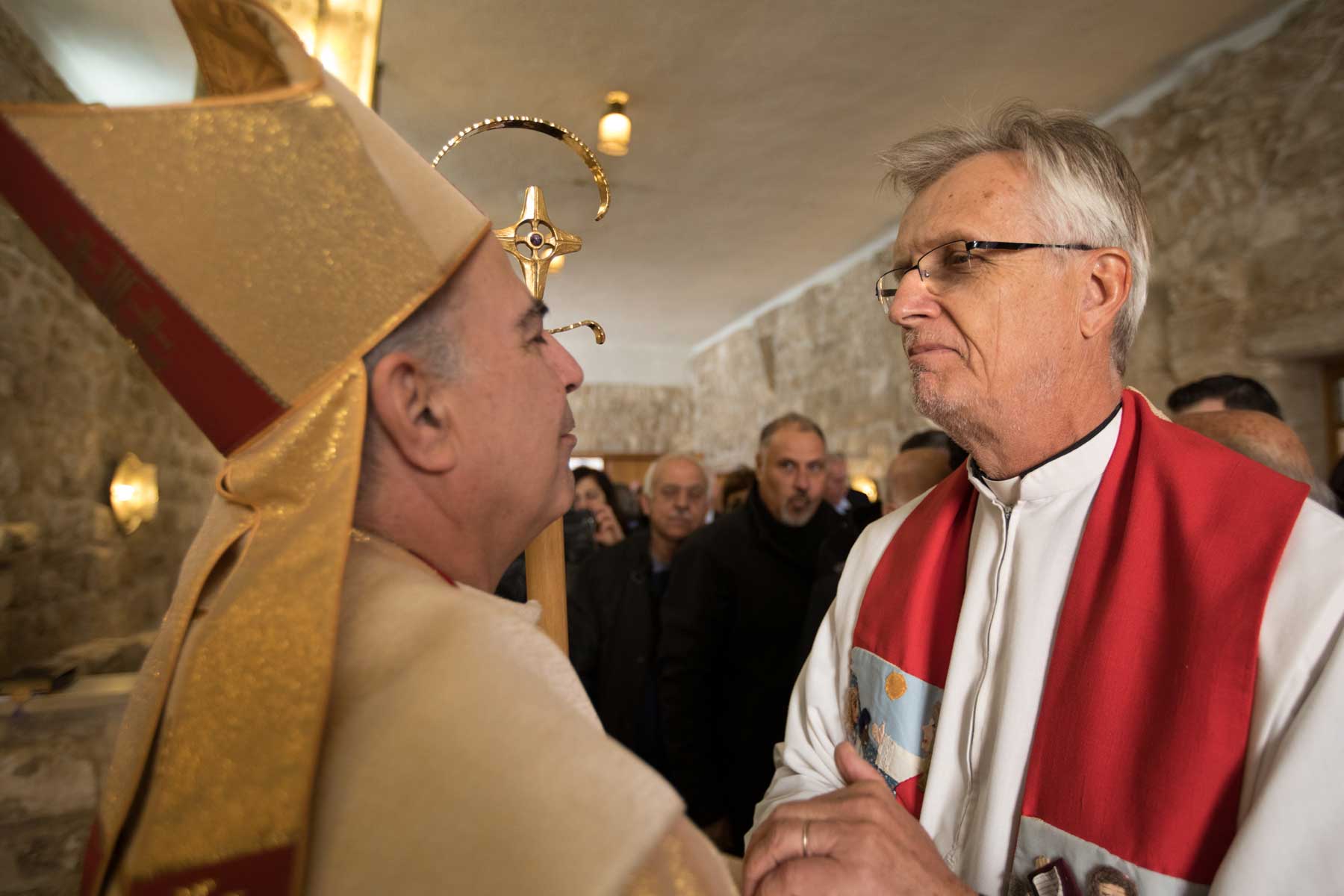
LWF General Secretary Rev. Dr Martin Junge with Bishop Azar at his consecration in Bethlehem. Photo: ELCJHL/ Ben Gray
What do you want to concentrate on as leader of the ELCJHL? What are your priorities?
Matthew 28, The Great Commission, tells us that we are to go and make disciples, baptizing and teaching: “Therefore go and make disciples of all nations, baptizing them in the name of the Father and of the Son and of the Holy Spirit, and teaching them to obey everything I have commanded you. And surely I am with you always, to the very end of the age.”
Our church will go to the people. We will not wait for them to come to our doors. This is our priority.
What does it mean for you to be part of the Lutheran communion?
The Evangelical Lutheran Church in Jordan and the Holy Land is the lone Lutheran church in the Middle East, but we are not alone. We are proud to belong to the many Lutheran churches around the world through our partnerships and through our communion with The Lutheran World Federation. This makes us strong.


